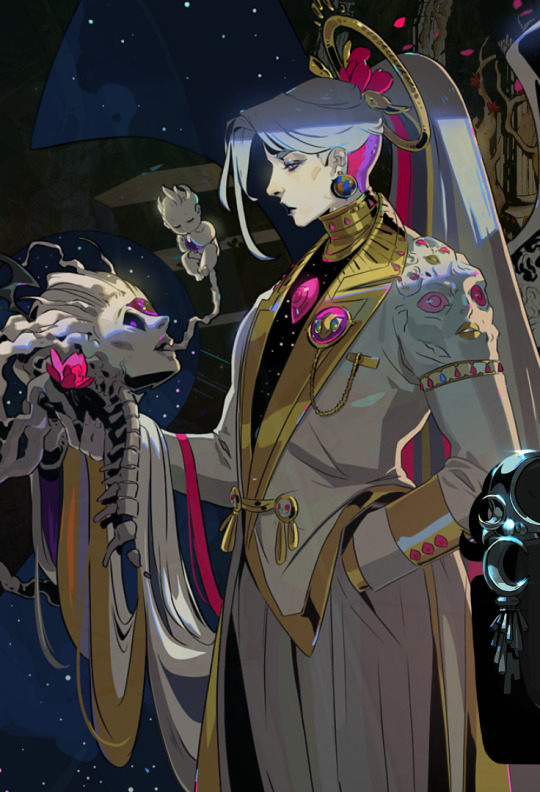#I'm happy a bunch of people seem to really like the new design. alas i am disappointed and chomping at my bars about it
Text
"Chaos' Hades 2 design is better because it's hot and having the genderqueer character be less eldritch is better representation"
Well maybe some of us genderqueers like interesting and thematic designs and identify more with eldritch monstrosities over conventional attractiveness? What about the unsettling weirdo representation for freaks like me 😔


Although holding the detached head and spine of your previous form does absolutely slap
#ramblings of a bystander#this was a longer rant before but i started getting analytical with it and i don't have energy for articulating that#I'm happy a bunch of people seem to really like the new design. alas i am disappointed and chomping at my bars about it#hades#hades 2#hades 2 spoilers#chaos hades 2#the longer rant also included analysis of chaos' old face kind of having similar facial features to [redacted]#which might have prompted or cemented supergiant doing such a redesign of chaos to avoid unintentional association? idk#i shall soon be off to block the hades 2 tag. I've seen enough of this game and want to save the rest for when i play it on full release ✌️#hades game#chaos hades
467 notes
·
View notes
Text
“Godzilla: King of the Monsters”: Just go with it, people

The new Godzilla should come with a disclaimer at the beginning asking you to turn off your brain along with your cell phone, and I mean that as a compliment. But also kind of as an insult. But mainly a compliment. Unless it's an insult. Which makes me think that it's more of a compliment.
Look, point is, when the big guy himself is onscreen, brawling against or alongside the scores of hairy, scaly, winged creatures that have risen to ravage our worthless asses, Godzilla: King of the Monsters is frankly spectacular summer entertainment on par with anything the final battle of Avengers: Endgame cooks up. But when the film turns its gaze towards the hapless humans scurrying around in the lizard king's wake, it turns into a different kind of stupid, where paper-thin characters shift motivations seemingly at random, profanely talented actors stare ponderously into the middle distance (better to do the math on the zeroes in the paychecks) and a crew of military jocks/science dorks sprout impenetrable jargon that serves as exposition. Ultimately, whether this movie is worth your while will depend on where you land with respect to that dichotomy: Is numbingly silly human drama worth sitting through to get to the endorphin high of a monster rumble?
undefined
youtube
In fairness, this movie has not been remotely shy about what it's selling us. Gareth Edwards' 2014 Godzilla, which this movie serves as a sequel to, teased the monster as a malevolent natural force and pump-faked him into a surly protector of humanity, albeit one with a conspicuous disregard for collateral damage. This one, from jump, has been marketed as a four-way showdown featuring Godzilla and three of his most notorious frenemies: The glowing insect Mothra, fiery pteranodon Rodan, and three-headed dragon, King Ghidorah. It shares a central thesis with its predecessor — long story short, humans are wasteful, horrible creatures who've ruined the planet, and we deserve what's coming to us — but to its credit, has no patience for the ponderousness with which Edwards approached the subject. Instead, it settles for a blunt-force, here's-what-I'm-doing-and-why speech by a scientist (Vera Farmiga) who seeks to use the monsters to restart the earth alongside someone the script has seen fit to designate as an "eco-terrorist" (a harrumphing, underused Charles Dance). What earned him that reputation is left mostly to the imagination; he is quiet, British, speaks in monosyllables and shoots a lot of extras, ergo, he is bad.
Along for the ride is Farmiga's daughter, Eleven — err, Madison (Millie Bobbie Brown from Stranger Things), who has been drawn into her mother's plan as ... a co-conspirator, I think? She seems oddly willing to go along with the extinction of humanity in principle, though her mom's execution of the plan leaves a lot to be desired. On the other end of the spectrum is her father (Kyle Chandler), another scientist of sorts who is trying to repair his own relationship with Madison -- her brother was lost in the events of the previous film, as established in a prologue that recalls Batman v Superman, of all things -- while also reconciling his own feelings about ... Godzilla? I think?
Yes, it's all very silly. And the director, Michael Dougherty, is visibly lacking the personal touches he brought to his last feature, the nasty, nihilistic horror-comedy Krampus from 2015. (Worth a watch, by the way.) But to his credit, he also seems to realize that this is not the reason for whence you have come. And when it comes time to get to the smashy-smashy stuff, he excels. His King of the Monsters may have ditched Edwards' sense of seriousness, but it wisely retains that filmmaker's eye for sheer, awe-inspiring scale. He knows how to use it a little better, I think, lingering less on the shots emphasizing the monsters' enormity and using them more as beats in the kind of viciously streamlined action sequences Edwards never felt the need to attempt. (The scene where the military tries to bait Rodan away from the Mexican village he's nesting above is so thrilling it took me out of the movie for a bit.)
It's to Dougherty's credit the effect isn't diluted despite the movie's dumbing down: Even if some of the best shots have been spoiled in the trailers, there's still something primally majestic about the sight of these monsters among us and the merciless destruction they wreak in a battle that is revealed to be, quite literally, older than time and beyond the scope of our world. It makes you wish both movies had done away with the speechifying entirely; the imagery in them is, frankly, enough to speak for themselves, and the people speaking are blindingly puny in comparison anyway. (That's is no reflection on the actors, a talented bunch that brings back Ken Watanabe, Sally Hawkins and David Strathairn from the first movie and expands to include Ziyi Zhang, O'Shea Jackson, Jr., Bradley Whitford, Aisha Hinds and Thomas Middleditch. They all seem pretty happy to be in a Godzilla movie. Good for them.)
Like all good bad movies, King of the Monsters does contain one single germ of a good idea: That all these other monsters are the only thing stopping Godzilla from turning his attention to us, the reason he has to come back in the first place. Edwards reimagined Godzilla as a burly, glowering sort, but his movie didn't go far enough to establish any kind of relationship with the humans at his feet. Dougherty, again to his credit, at least tries to create a dynamic: This beefy, lumbering Godzilla has the air of a blue-collar dad who comes home to find his spoiled kids have trashed the joint and wearily resigns himself to setting things right. He lumbers from mess to mess, spewing fire and moving on to the next one before things get really out of hand. (As if to drive the point home, at one point in King of the Monsters, he actually takes a nap.) Unspoken in all of this is whether we as a species are worth this aggravation, save for a throwaway line at the end, and you wish the script, by Dougherty, Zach Shields and Max Borenstien, had made a little more room for the kind of existential query that would give this movie some urgency, especially in an age where climate change has become an existential question.
Alas, no time for that. There's cities to smash, some queasily so (Boston is completely disintegrated in a nuclear holocaust — go Yankees?), people to eat, overqualified actors to kill off and a hairy fellow glimpsed only in shadow on the periphery, patiently awaiting his own throwdown next year. (Stay through the very entertaining, creative credit sequence for some setup on that front.) Again, this isn't necessarily an insult. Godzilla may have begun as a metaphor for Hiroshima, but it's worth noting that his legacy is probably more in line with the cheesy, B-movie, man-in-suit movies that followed suit, so the movie isn't quite as out of line as you might think by choosing destruction over allegory. Nonetheless, even the most forgiving of viewers might be tested with its final sequence, a bombastic, ridiculous scene that is probably the dumbest thing ever put to film — unless it's your thing, in which case it's the coolest thing you've ever seen. (Full disclosure: It’s totally my thing.) It's to King of the Monsters' credit that it plants its flag, then and there, as to what kind of movie it's trying to be, and if I do say so myself, it's to your credit if you go along with it: You're allowed to like a dumb movie. But there's nothing wrong with quietly wishing that it was a little smarter, too.
0 notes